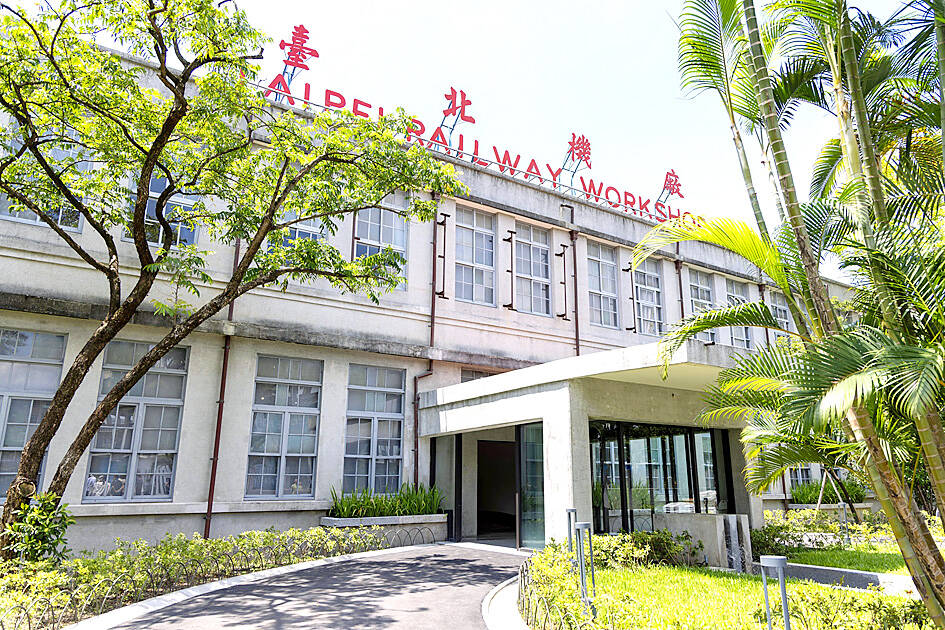The National Railway Museum is to partially open to the public on July 31 after nine years of restoration work at the historical site formerly known as the Taipei Railway Workshop, allowing visitors to revisit an important period in Taiwan’s railway history.
The areas to be opened to the public include a diesel workshop, a technician training institute, a materials testing institute, an assembly hall, a bathhouse, and a children’s area with trains built using toy blocks, the Ministry of Culture (MOC) said yesterday.
In addition, a 335-meter passageway that bisects the complex in Taipei’s Songshan District will also be available for public use, acting as a footpath linking Civic Boulevard and Keelung Road, it said.

Photo courtesy of the Ministry of Culture
This will improve pedestrian access, enhance neighborhood connectivity, and offer visitors a close-up view of the site’s historic architecture and skyline of industrial rooftops, it said.
People will be able to visit three permanent and three special exhibitions at the museum, covering topics from locomotives, the diesel factory, the bathhouse to Taiwan’s railway history and culture, and the life of late railway photographer Ku Jen-jung (古仁榮).
The MOC said Taipei Railway Workshop was relocated from the Beimen area to its current site and completed in 1935, where it served for decades as Taiwan’s hub for train maintenance, assembly and repair.
After the workshop was relocated to the Fugang Vehicle Depot in 2012, public advocacy led to the entire 17-hectare site being declared a national historic site in 2015.
In December 2016, the Cabinet approved a plan to transform the workshop into a museum, and by 2019, restoration work had begun, and a museum preparatory office was established.
The project adopted a phased approach: full-area preparation, sectional restoration and phased public openings.

The Mainland Affairs Council (MAC) today condemned the Chinese Communist Party (CCP) after the Czech officials confirmed that Chinese agents had surveilled Vice President Hsiao Bi-khim (蕭美琴) during her visit to Prague in March last year. Czech Military Intelligence director Petr Bartovsky yesterday said that Chinese operatives had attempted to create the conditions to carry out a demonstrative incident involving Hsiao, going as far as to plan a collision with her car. Hsiao was vice president-elect at the time. The MAC said that it has requested an explanation and demanded a public apology from Beijing. The CCP has repeatedly ignored the desires

Many Chinese spouses required to submit proof of having renounced their Chinese household registration have either completed the process or provided affidavits ahead of the June 30 deadline, the Mainland Affairs Council (MAC) said on Thursday. Of the 12,146 people required to submit the proof, 5,534 had done so as of Wednesday, MAC deputy head and spokesperson Liang Wen-chieh (梁文傑) said. Another 2,572 people who met conditions for exemption or deferral from submitting proof of deregistration — such as those with serious illnesses or injuries — have submitted affidavits instead, he said. “As long as individuals are willing to cooperate with the legal

The Ma-anshan Nuclear Power Plant’s license has expired and it cannot simply be restarted, the Executive Yuan said today, ahead of national debates on the nuclear power referendum. The No. 2 reactor at the Ma-anshan Nuclear Power Plant in Pingtung County was disconnected from the nation’s power grid and completely shut down on May 17, the day its license expired. The government would prioritize people’s safety and conduct necessary evaluations and checks if there is a need to extend the service life of the reactor, Executive Yuan spokeswoman Michelle Lee (李慧芝) told a news conference. Lee said that the referendum would read: “Do

The Ministry of Environment yesterday held a seminar in Taipei for experts from Taiwan and Japan to exchange their experiences on the designs and development of public toilets. Japan Toilet Association chairman Kohei Yamamoto said that he was impressed with the eco-toilet set up at Daan Forest Park, adding that Japan still faces issues regarding public restrooms despite the progress it made over the past decades. For example, an all-gender toilet was set up in Kabukicho in Tokyo’s Shinjuku District several years ago, but it caused a public backlash and was rebuilt into traditional men’s and women’s toilets, he said. Japan Toilet Association